The Ceramic Legacy of Panos Valsamakis in Athens
The workshop of famed tile painter...
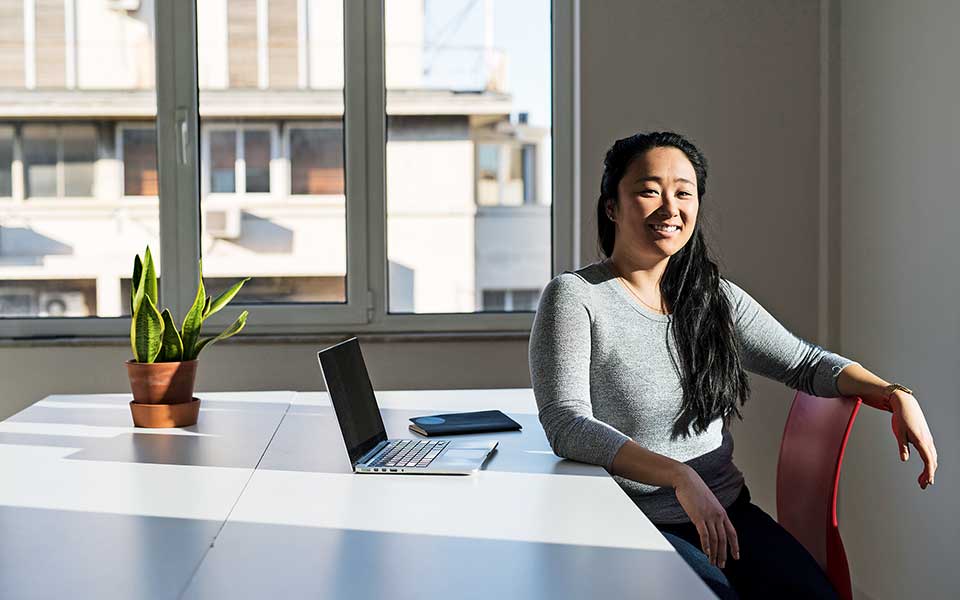
Lucy Xu
© Thalia Galanopoulou
The only thing I need is my laptop,” explains Steffen Geist, a German computer programmer working from the Stone Soup co-working space in central Athens. At his base in Berlin, Steffen noticed it was getting darker and colder as autumn rolled in. “I thought, let’s go where the sun is,” he says. “My customers are all based in Germany but I can communicate with them on Slack. Athens has a growing tech scene, so I decided to work here for a month. I made cool friends and found some great bars, so I’m sure I’ll be back.”
Steffen is part of a growing movement of remote workers or ‘digital nomads’ who’ve found a way to work wherever they choose. Freed from desk jobs, all they need is fast internet and they can offer their services as designers, copywriters, marketers, entrepreneurs or, like Steffen, programmers, to international clients online.
With the ability to earn an income anywhere in the world, freelancers and digital nomads are flocking to Athens – whether for a few days, weeks or months. They’re drawn by the city’s world-renowned culture, climate and hospitality, as well as by a growing network of co-working spaces that cater to a wide range of professionals and offer so much more than just a desk. For creatives and techies alike, these co-working hubs offer everything from networking opportunities and social activities to link-ups with both local and international business and investment.
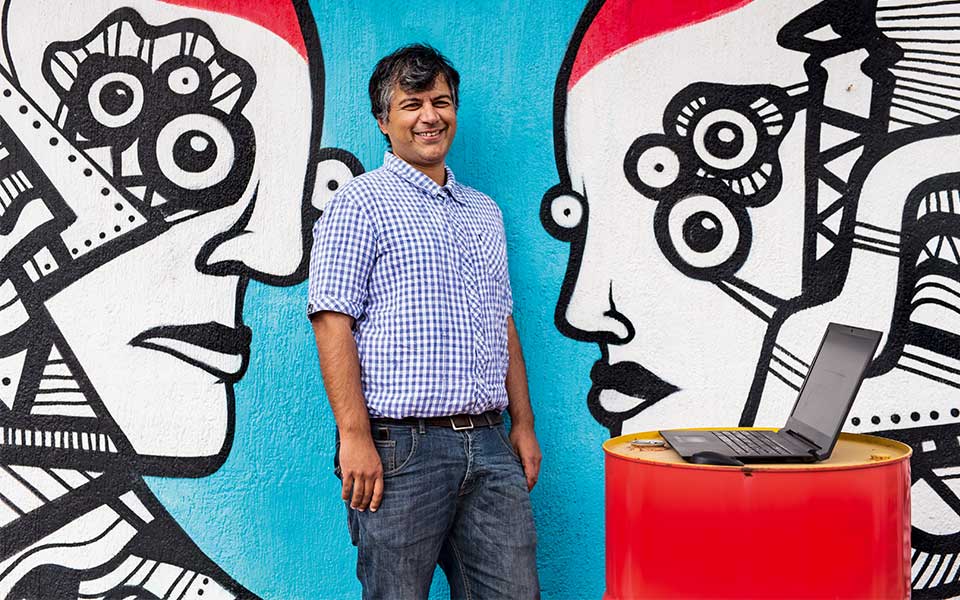
Zafar Iqbal
© Thalia Galanopoulou
ZAFAR IQBAL
Software Developer
“When I used to work for companies in office jobs, I always wished I could control my own space and time,” explains Zafar Iqbal, a software developer from the town of Burnley in the UK. “Today, I have the freedom and flexibility to work on my own terms. Having full control over what I do is pretty cool.”
Zaf (as he prefers to be known) works freelance for a wide range of clients, developing custom software, web and mobile applications and even custom hardware for electronic devices. He works from The Cube, which he says is a great place to meet people and be encouraged by others, as well as a regular source of new clients.
“Most clients don’t come from advertising, they come through people I’ve met, through having a network,” Zaf explains. Owners Maria and Stavros often recommend him to teams using the space, and he’ll pick up three- to six-month contracts working on specific projects.
“It’s refreshing that The Cube has a makerspace and has an almost hacker atmosphere, rather than a corporate environment,” he says. “It’s a great place for networking. You chat and then go out for dinner with people. But you can’t overdo it, you still have to be disciplined enough to get your work done and find time to create. I always want to be making things.”
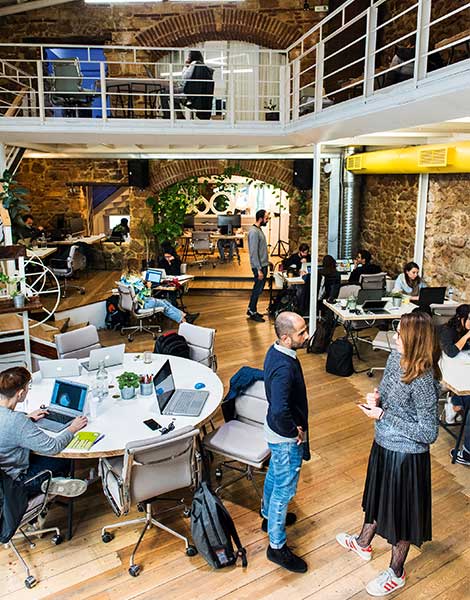
Impact Hub
© Thalia Galanopoulou
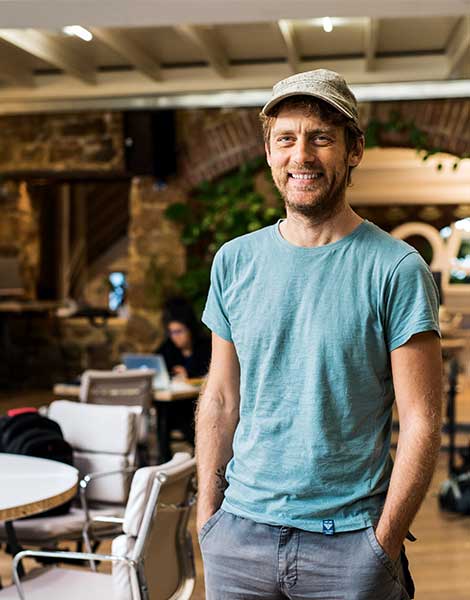
Stathis Athanasiou
© Thalia Galanopoulou
Impact Hub is the world’s largest network for socially-conscious entrepreneurship and activism, with over 100 hubs in more than 50 countries. Sophie Lamprou and Dimitris Kokkinakis worked in established Impact Hubs in Madrid and Vienna respectively for nearly three years as they investigated the network’s potential and explored how they could apply the concept successfully in a Greek context.
“People are now able to move more freely than ever before,” Sophie says. “But we still seek human interaction, ways to be connected beyond the digital realm and random encounters with new people and ideas.”
Impact Hub Athens opened in 2013 in a renovated neoclassical townhouse and has, arguably, the best location in Athens: right in the lively center of Psyrri and just three minutes from the central metro station at Monastiraki. Home to international journalists, human rights NGOs and ethical businesses, the hub has become a popular event location for the humanitarian and ecological sectors. Alongside the co-working space, they also run a children’s orchestra – the Greek chapter of El Sistema, a worldwide social-inclusion-through-music program; Hydrousa, a water preservation and circular economy initiative; and the Municipal Market of Kypseli, the first social economy market in Greece.
“The Hub is a place where people blazing a more courageous path can support and inspire each other,” Dimitris says. “We believe a bigger community of socially-engaged people can achieve more.”
STATHIS ATHANASIOU
Film Director
When Stathis began trying to produce his second feature film, all the conventional paths were blocked. It was 2012 and both the traditional distribution model for films and the Greek economy were collapsing. “This set me free, emotionally,” he recalls. “I could do whatever I wanted and still have a better chance of success than following what everyone had done for the last 110 years.”
His film, “Alpha,” inspired by Sophocles’ 2,500-year-old story of a young princess named Antigone who confronts state power to bury her dead brother, would become Greece’s first-ever crowdfunded feature film, distributed under Creative Commons licensing, and accompanied by live performances at certain venues.
Indiegogo was barely known at this point, so Stathis and his team faced an uphill battle introducing crowdfunding to a Greek audience. During an extensive outreach process, Stathis met Sophie Lamprou and Dimitris Kokkinakis, who were then presenting the idea for Impact Hub Athens at TEDx.
Following the release of “Alpha” in 2013, Stathis was searching for a new office, when he remembered Impact Hub. “I saw the space and, in a millisecond, I felt I had to be here,” he explains. “It’s like a big house; it has a strong sense of family for me. There’s constant movement, people always doing stuff, eating and talking. It brings back feelings from my childhood and memories of people mingling in my grandparents’ village.”
Stathis appreciates the wide range of people who pass through the Hub, not just for the conversation, but to bounce ideas around with. “I love mingling with people I wouldn’t normally mingle with,” he says. “It’s nice to talk to someone who doesn’t have an idea about your business or your field. You can often give each other useful feedback and it’s an opportunity to get a fresh, un-jaded perspective on what you’re doing.”
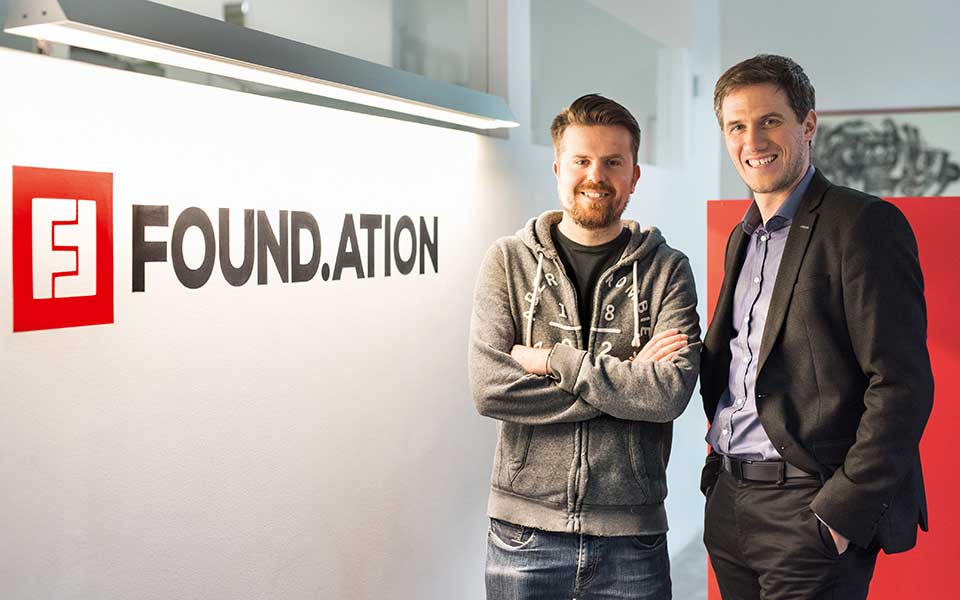
Found.ation
© Thalia Galanopoulou
Found.ation in Petralona is a co-working space, a digital transformation accelerator for corporations and a startup incubator with global ambitions. It was born in 2011 when a team of likeminded people from TEDxAthens decided to create a physical space to foster the city’s most brilliant minds.
TEDxAthens was founded in 2009 by Dimitris Kalavros-Gousiou, one of the co-founders of Found.ation, while he was still a student. The platform really took off around 2012, a time when Greeks became increasingly hungry to take part in social dialogue, understand international trends and play a greater role in creating positive change. It was through TEDx that Dimitris met Filippos Zakopoulos, now Found.ation’s managing director, and the pair decided to channel their shared zeal for innovation and renewal into the creation of a business space.
“The TEDx Athens platform is a push towards establishing the society and values we want; values of openness and change,” Filippos explains. “The Found.ation platform is also looking at how to adapt and evolve in a changing world, through corporations and startups working together. In Greece, as in Europe as a whole, there’s a real need for re-skilling and up-skilling to take advantage of new digital tools.”
Found.ation provides advisory services to firms facing the challenges posed by the digital economy as well as a co-working space that’s hosted a variety of SMEs working in tech – from software to artificial intelligence, traveltech and fintech. To increase their impact, Found.ation created an independent venture capital arm; it administers funds from private investors and the European Investment Fund-controlled EquiFund platform. This vehicle, Velocity.Partners, has raised €23.9 million to invest in early-stage ventures in Greece and across the Balkans.
Like many Athens co-working spaces, Found.ation was born from a desire to stem the destruction caused by the economic crisis. But now, rather than fighting brain drain, it’s focusing on brain gain, attracting top talent from Greece and abroad; helping startups scale up; working with Greek companies to help them tackle disruption; and building a thriving ecosystem for development, investment and innovation. “It’s a great time to be in the tech or creative sectors here,” Dimitris says. “The lifestyle is unparalleled: Athens is a very welcoming city, culturally and socially. But now we also have the skills, are attracting the talent and have the capital to back us up. We need to raise our expectations and understand that we have all the ingredients to succeed on an international level.”
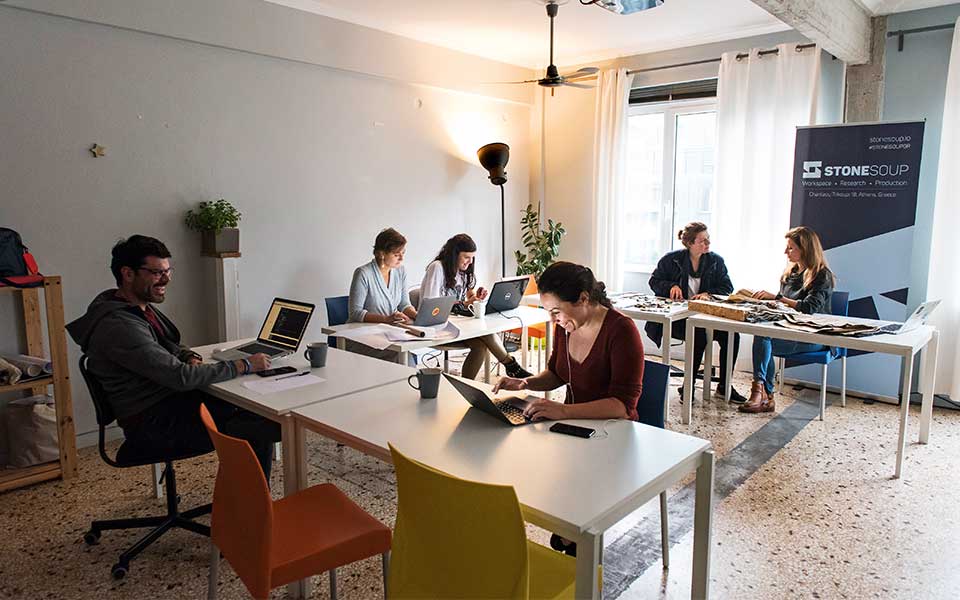
Stone Soup
© Thalia Galanopoulou
“When we opened in 2014, everyone in the space was Greek,” says Olga Paraskevopoulou, co-founder of Stone Soup. “Today, roughly half are from around the world. Athens is a great city to live in. Many things are much cheaper than in northern Europe, the climate and diet is much better, and, most importantly, the human interactions are richer.”
Before Stone Soup, Olga was in Amsterdam, working with universities and municipalities to organize events, seminars and training sessions, and collaborating on projects such as Code for Europe. “In the midst of the economic crisis, I felt like the skills I’d acquired in managing projects, encouraging collaboration and acquiring funding would matter more in Greece,” Olga says. “I hoped to create a haven for the talented professionals brave enough to stay in Greece, and to give them world-class opportunities.”
Stone Soup took over an entire floor of a downtown office building and began to attract a wide range of people and businesses. Today, it offers co-working space and IT consultancy, and hosts events that bring people together across disciplines.
LUCY XU
Marketer, Startup Advisor
“There’s so much opportunity to do things here in Athens, and to be inspired to explore your creativity,” says Lucy, a Chinese-American from New York. “There are new ideas being developed and created across many different areas, especially in the startup world. It’s exciting.” After experiencing Greece on holiday, Lucy decided to move to Athens in 2016 and began working with local startups. While she was inspired by the dynamism of the local scene, she recognized there were skill and resource gaps but was confident that the best practices she’d learned in New York and Silicon Valley could be of great benefit to the burgeoning Greek tech market.
Lucy founded The Port, a marketing and business development consultancy for the startup scene, from a base in Stone Soup and has worked on building bridges and sharing skills between the American and Greek tech sectors ever since. The Port hosts workshops (such as Marketing for Startups, also held at Stone Soup) and offers services and resources to help startups and other businesses “navigate uncharted waters.”
There are many differences between Greek and American business cultures, but Lucy has enjoyed adapting to a different pace of life and a more relationship-based culture in Greece. With no end date to her time in Athens, she’s committed to the long haul. “I want to grow the business and help release the untapped potential here,” Lucy says. “It will be interesting to see what the future holds for Athens and for Greece.”
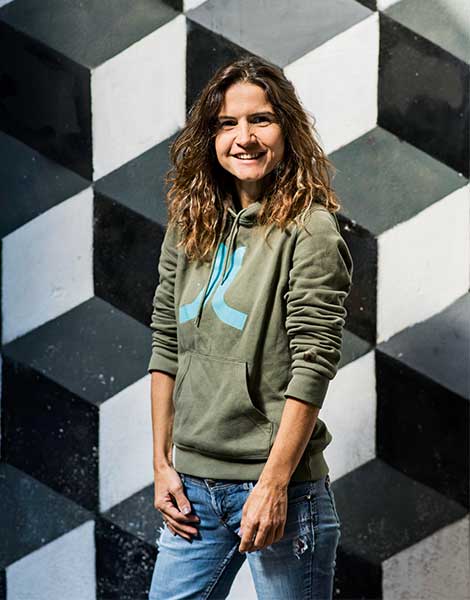
Maria Kalafati
© Thalia Galanopoulou
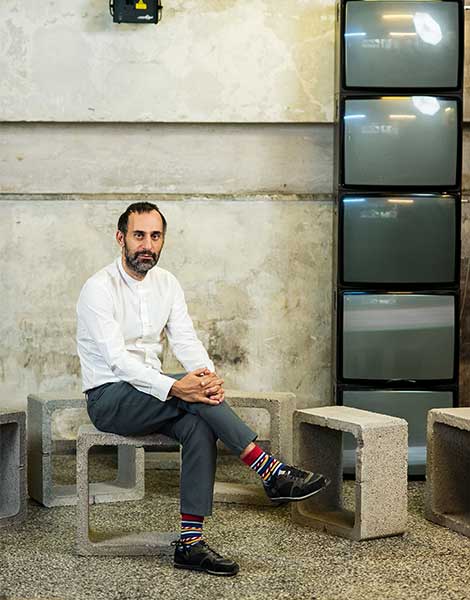
Vassilis Haralambidis
© Thalia Galanopoulou
One of the biggest tech successes to emerge from the Athens co-working scene is Beat (formerly known as TaxiBeat), a ride-hailing app created by Nikos Dradakis in 2011 – a year before Uber entered the taxi market in 2012. In February 2017, it was bought by Daimler in Germany for €43 million. Today, 90% of Beat journeys occur outside Greece, in cities across South America. Beat’s own journey began at CoLab, Athens’ first co-working space, which opened in 2009; it was co-founded by Stavros Messinis and his partner Maria Calafatis, who’ve become an Athens tech-industry and startup power couple.
“Stavros and I are risk-takers,” Maria says. “Crisis brings opportunity. We, too, were affected by the crisis, but we were bold, crazy and young enough to risk everything.” After helping launch CoLab, they struck out alone, opening The Cube in a much larger space in Exarchia in 2012. This moment catalyzed a wave of new co-working spaces, as people tried to adjust to the new economic realities – but many soon folded.
The Cube, on the other hand, has gone from strength to strength, thanks to its founders’ belief in the Greek entrepreneurial spirit and their ability to leverage an extensive network of talent, mentors and funders in support of fledgling projects. Catering primarily to tech startups, entrepreneurs and non-profit organizations, The Cube’s seven floors comprise offices, meeting and seminar rooms, a makerspace and an events space – with regular events ranging from UX developer meet-ups to sessions on how to train your pet parrot.
“Innovation and entrepreneurship can be a lonely and challenging path,” Maria says. “You have to understand the needs, the talent and the pain. Building a strong community is so important. Co-working isn’t a business that will pad your wallet, but you get rich in other ways; through encouraging new collaborations, you’re rewarded by seeing the impact you have and the success you help create.”
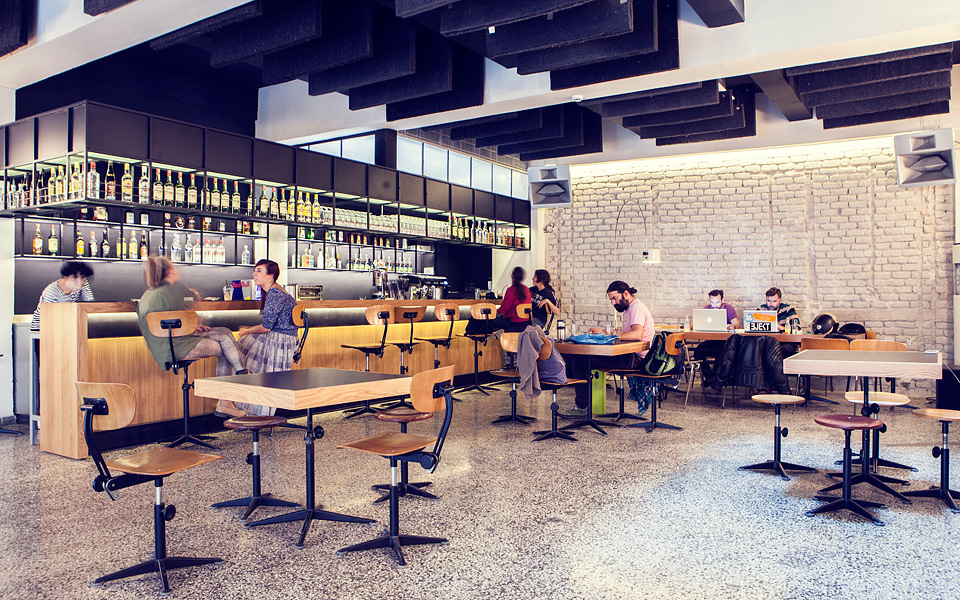
The bar at Romantos where many informal work meetings are held.
Faced with particularly difficult economic circumstances in recent years, professionals from many sectors have weathered the storm by coming together – and Romantso is indisputably the focal point for Athens’ creative industry.
“The creative sector has always been precarious, both here and abroad,” says graphic designer and Romantso founder Vassilis Haralambidis. “Romantso was conceived not only as a production house, but also as a social space. Creative people have very different needs. They don’t like models or programs; the process is much more organic, and unpredictable.”
After years spent running the BIOS bar and arts venue in Kerameikos, Vassilis wanted to do something more ambitious and give a much-needed boost to the local creative scene. He found the answer in a striking but derelict 1940s office building. Over time, the space was restored to its former glory, and period details such as the marble staircase and the exterior neon signage were rescued. Today, Romantso functions as both cultural center and incubator, with 24 separate offices that range from shared desks to totally private spaces, sandwiched between a bar, a gallery, a downstairs venue and a rooftop party space. There is a diverse and ever-changing mix of artists, freelancers and creative businesses. Those selected for the incubator program are chosen on the basis of their portfolio and potential, rather than their business model, and start out using the space for free.
In partnership with like-minded projects across the continent, the BIOS Foundation (which comprises BIOS and Romantso) helped launch the European Creative Hubs Network and can take much credit for stimulating the recent artistic renaissance in Athens. The vibrancy of Athens’ arts scene today has transformed the city into an ever-more desirable destination for foreign creatives.
“There’s a great deal of dialogue and exchange of ideas with the rest of Europe,” Vassilis says. “I think creatives are attracted by this ‘urban exotica style’ – there’s a chaotic decadence. You have influences from East and West colliding; it’s like a melting pot.”
Spaces Athens 56 Ermou, Tel. (+30) 210.727.9000
Spaces MAROUSI Green Plaza, 117 Kifissias, Tel. (+30) 210.727.9000
Free public study area at Stavros Niarchos Foundation Cultural Center, 364 Andrea Syngrou, Tel. (+30) 216.809.1000
The workshop of famed tile painter...
A major restoration project is bringing...
A nexus of Hellenic research, the...
Ten must-do experiences in Athens, from...